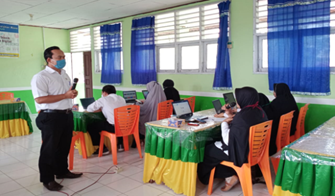Improving MGMP teachers’ self-efficacy through technical guidance in learning from home program
DOI:
https://doi.org/10.22219/jcse.v2i2.16506Keywords:
Learning Community, Learn Frome Home, Self-efficacyAbstract
The target of this technical guidance was secondary teachers of natural sciences, social sciences, and language who were members of the Teachers Professional Development Forum or Musyarawah Guru Mata Pelajaran (MGMP) in Siak Kecil, Bengkalis Regency. This training aimed to provide digital literacy strengthening for teachers in designing, implementing, and evaluating home-learning programs. This technical guidance was carried out through an online platform (Zoom) and offline mentoring in the MGMP discussion forum. The technical guidance mechanism consists of training and simulations in designing digital learning media in PowerPoint presentations, video monologues, e-student worksheets, and e-modules using software applications such as Filmora, Explee, Sigil, and Kinemaster. The results of this technical guidance were increasing self-efficacy with indicators of confidence in completing tasks (high), internal motivation (high), persistence (high), and being able to overcome obstacles and difficulties (high). There was also an increase in teachers' digital literacy in the aspects of data awareness (good), data analysis skills (sufficient), and ability to focus (excellent). The assessment of the results also showed that participants could design and use applications to carry out digital learning from home. Overall, this technical guidance positively impacted teachers' Continuing Professional Development (CPD), especially secondary teachers in Siak Kecil and Lubuk Dalam Sub-districts in Riau Province.
Downloads
References
Akayoğlu, S., Satar, H. M., Dikilitaş, K., Cirit, N. C., & Korkmazgil, S. (2020). Digital literacy practices of Turkish pre-service EFL teachers. Australasian Journal of Educational Technology. 36(1): 85–97. https://doi.org/10.14742/ajet.4711
Anisimova, E. S. (2020). Digital literacy of future preschool teachers. Journal of Social Studies Education Research. 11(1): 230–253.
Blazar, D., & Kraft, M. A. (2017). Teacher and teaching effects on students’ attitudes and behaviors. Educational Evaluation and Policy Analysis. 39(1): 146-170. https://doi.org/10.3102/0162373716670260
Fatmawati, Rio, D., & Trihartantyo, L. (2020). Hubungan Self efficacy terhadap prokrastinasi guru pendidik di SMP N 1 Kretek. 13(1): 126–131.
König, J., Jäger-Biela, D. J., & Glutsch, N. (2020). Adapting to online teaching during COVID-19 school closure: teacher education and teacher competence effects among early career teachers in Germany. European Journal of Teacher Education. 43(4): 608–622. https://doi.org/10.1080/02619768.2020.1809650
Liza, K., & Andriyanti, E. (2020). Digital literacy scale of English pre-service teachers and their perceived readiness toward the application of digital technologies. Journal of Education and Learning (EduLearn). 14(1): 74–79. https://doi.org/10.11591/edulearn.v14i1.13925
Marini, S., Hanum, F., & Sulistiyo, A. (2020). Digital literacy: Empowering Indonesian women in overcoming digital divide. ICoSSCE 2019. 398: 137–141. https://doi.org/10.2991/assehr.k.200130.029
Ningsih, W. F., & Hayati, I. R. (2020). Dampak Efikasi Diri terhadap Proses & Hasil Belajar Matematika. Journal on Teacher Education. 1(2): 26–32.
Peter, J. O., & Benardatte, M. N. (2020). Analysis of self efficacy as intervention strategy in management of burnout among teachers in Busia County, Kenya. International Journal of Education and Research. 8(1): 1–14.
Poulou, M. S., Reddy, L. A., & Dudek, C. M. (2019). Relation Of Teacher Self-Efficacy And Classroom Practices: A Preliminary Investigation. School Psychology International. 40(1): 26-48. https://doi.org/10.1177/0143034318798045
Pratolo, B. W., & Solikhati, H. A. (2020). The implementation of digital literacy in Indonesian suburban EFL classes. 9(01): 1508–1512.
Pujaningsih, & Ambarwati, U. (2020). Self Efficacy Changes In Collaborative Course For Inclusive Education Preservice Teachers. Cakrawala Pendidikan. 39(1): 79–88. https://doi.org/10.21831/cp.v39i1.26669
Putri, F. A. R., & Fakhruddiana, F. (2019). Self-efficacy guru kelas dalam membimbing siswa slow learner. Jurnal Pendidikan Khusus. 14(1):, 1–8. https://doi.org/10.21831/jpk.v14i1.25161
Rahyasih, Y., Hartini, N., & Syarifah, L. S. (2020). Pengembangan keprofesian berkelanjutan: Sebuah Analisis kebutuhan pelatihan karya tulis ilmiah bagi guru. Jurnal Penelitian Pendidikan. 20(1): 136–144. https://doi.org/10.17509/jpp.v20i1.24565
Rusdarti, Slamet, A., & Sucihatiningsih. (2018). Pengembangan keprofesian berkelanjutan dalam pembuatan publikasi ilmiah melalui workshop dan pendampingan bagi Guru SMA Kota Semarang. Jurnal Rekayasa. 16(2): 271–280. https://journal.unnes.ac.id/nju/index.php/rekayasa/article/view/17562
Wangid, M. N., Mustadi, A., & Mokshien, S. E. B. (2020). The exploration of teachers’ efficacy in teaching: Comparative study in Indonesia and Malaysia. Cakrawala Pendidikan. 39(2): 257–268. https://doi.org/10.21831/cp.v39i2.30012

Downloads
Published
How to Cite
Issue
Section
License
Copyright (c) 2021 Suryawati & Harfal

This work is licensed under a Creative Commons Attribution-ShareAlike 4.0 International License.












